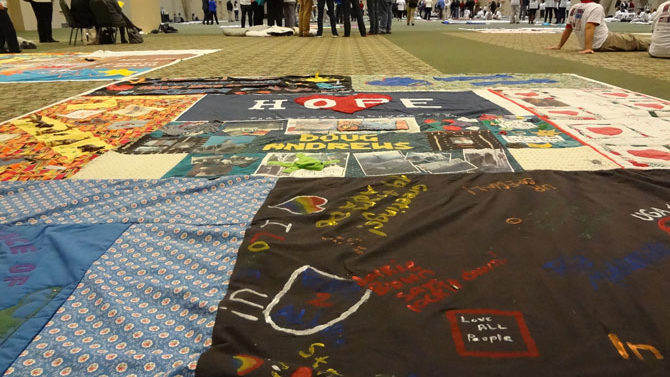Bruce Jr. was the son of my grandmother’s best friend. He was not of my parents’ generation nor was he of my own. He bridged the gap. To me, as a young boy, he was like an older cousin—lively, energetic, youthful, adult, fun.
I did not get to see very much of Bruce as I grew up in rural North Carolina. Bruce lived in New York, which is what I thought everyone around me meant when, as a young child, the local women and men whispered about Bruce being “that way.” To my young ears, “that way” meant he had become a Northerner.
Bruce’s mother went to New York on an extended visit when I was only 10 years old. I didn’t know it at the time, but she was there to see him through his last months of life. She, along with his partner and his friends, celebrated his life and mourned his death before coming home to have a local funeral.
I was young, I was fond of Bruce and loved his mother, and I was unaware of the reality of Bruce’s death. In our small-town Southern world, Bruce had died of some mysterious illness that no one wanted to talk about. At his funeral, I saw a line of beautiful, strong-willed, loving men enter, and I immediately knew what “that way” had meant all along, but I still had yet to know any words to express it.
Bruce’s mother saw in me the shimmering light of her son, and she took me in to share with me his true self and his tragedy. She never told others the truth. They all knew anyway and forced her silence. She gave me the voice to speak up for myself as a gay man and for that debt, I have ever since been an active advocate for HIV/AIDS causes and for the people who are daily diagnosed and are living with the disease in my community and around the world.
Last week, the largest section of the AIDS Memorial Quilt ever assembled in the Southeast was in Athens to commemorate 25 years of service to this community by AIDS Athens. Many of the 600 quilt panels on display were made by people who would not be silent anymore, people who not only needed to express their grief but wanted to celebrate the lives of friends and loved ones. But the quilt is more than that. It helps to spread the word about HIV/AIDS and to humanize the risks associated with contraction. It allows us to start conversations in places and about things where silence has been allowed to prevail for far too long. It reminds us that while living with this disease is now a possibility, dying from it is still a reality.
I am incredibly proud of the work that AIDS Athens does for Northeast Georgia. The staff and volunteers have an amazing dedication to their work, the clients they serve and the proactive educational programming they provide. According to Olivia Long, the executive director of AIDS Athens, 78 percent of its clients are medically compliant, compared to the 25 percent national average—an amazing accomplishment.
But there is still work to be done. We have people in this community who do not believe that this disease can affect them, who think that it is a punishment for poor behavior or some sin of choice, who feel that what we are doing is shameful and we should be silenced like Bruce and his mother. We have health service agencies in this community who have ceased to offer direct testing and support for HIV/AIDS, choosing instead to refer only to AIDS Athens, whose limited budget and staffing power is already stretched to its limits. We have an alarming increase in the number of new infections among young people in our community, especially young gay men who are of traditional college age, and our community response is drastically insufficient.
These problems cannot be solved by one person or by one organization. As we celebrate 25 amazing years of service by AIDS Athens, it is time for us to step up and speak out. It is time for us to recommit ourselves to this cause and redouble our efforts to provide solid service, support and education. AIDS Athens’ funding is primarily grant-driven, and grants are so specific that at times it is difficult to make basic ends meet. So, I ask you to give a donation today or get involved by going to www.aidsathens.org.
I speak for Bruce and for his mother, I speak for countless others we have lost, I speak for the young people afraid to be tested. I speak for those who are still scared. For whom will you speak?
Like what you just read? Support Flagpole by making a donation today. Every dollar you give helps fund our ongoing mission to provide Athens with quality, independent journalism.






